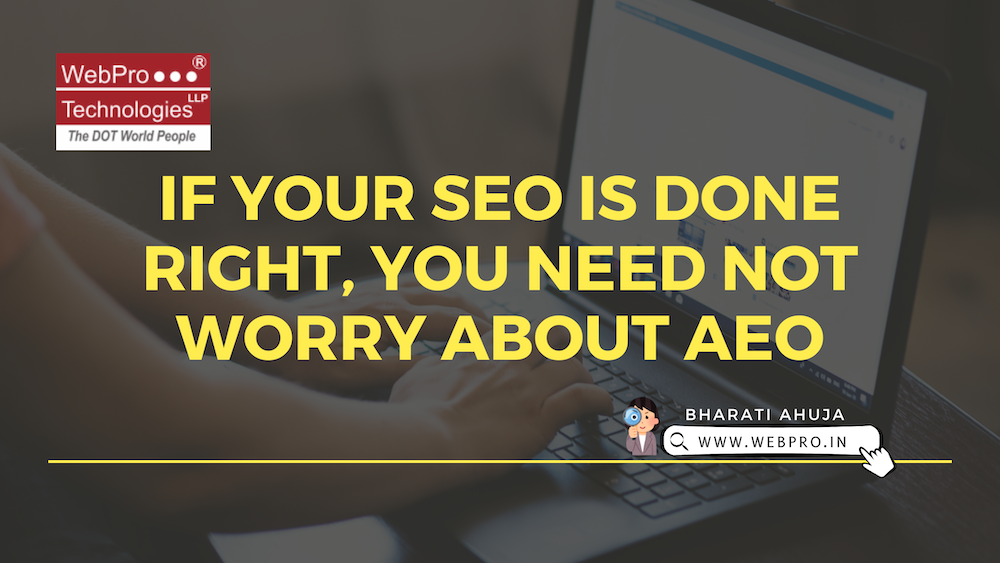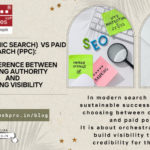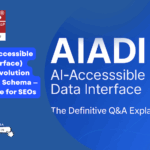The search industry has a new buzzword every few years. Today, everyone is talking about AEO – AI Engine Optimization or Answer Engine Optimization – GEO Generative Engine Optimization.
👉 “While I generally avoid using acronyms like AEO or GEO, I’ve included them here only to draw a clear distinction and reinforce the point made in the title.”
The rise of AI mode of Google Search, Bing Copilot, Perplexity, and ChatGPT with browsing has made marketers ask: Do we need to optimize differently for AI-driven search results?
The short, simple and straight forward answer is: Not really—if your SEO fundamentals are strong. Let’s delve deep and understand - why genuine SEO still wins in the age of AI.
For years, SEO professionals have been building websites that are crawlable, understandable, and trustworthy. We’ve focused on structured data, authoritative content, internal linking, and credibility signals. Ironically, these are the exact foundations that AI search systems also rely on when they extract and summarize answers.
I would like to clarify here why traditional SEO done right already positions you well for AI search, what small nuances might matter in the AI era, and provides a practical checklist to guide clients.
Why Traditional SEO Covers the Ground for AI Search
- AI Search Still Feeds on the Open Web
Large Language Models (LLMs) don’t invent authority out of thin air. They consume, summarize, and reference web content. If your site already ranks well because of strong SEO, it is in the right place to be surfaced by AI summaries.
- Structured Data Is Your Best Friend
Schema markup, FAQs, How To, Product Pages, and review schema provide clarity to search engines. This same structured information also makes it easier for AI to extract clean, contextual snippets. If you’ve been disciplined about structured data, you’ve already optimized for AEO without realizing it.
- E-E-A-T Matters More Than Ever
Expertise, Experience, Authoritativeness, and Trustworthiness have always been SEO cornerstones. In the AI era, these signals help LLMs choose which sites to trust when citing answers. About Us pages, author bios, team LinkedIn references, and external mentions are vital trust markers.
- Depth and Clarity Win
Thin content rarely survives in classic SEO, and it won’t work in AI search either. In-depth, well-structured, and clearly segmented content gives AI systems something they can confidently summarize and cite.
- Internal and External Linking Are Context Builders
AI models rely on context. Your internal links show relationships between topics. External authoritative links signal reliability. Both help AIs understand where your content fits into the broader knowledge graph.
How AI Search Differs Slightly
While the fundamentals overlap, there are subtle differences worth noting:
- Conversational Queries
AI search often comes from multi-turn, natural language questions. Pages that directly answer questions in a conversational tone stand out. - Content Granularity
AI search loves snippets. Breaking content into digestible sections with clear subheadings, FAQs, and summaries increases the chance of being cited. - Attribution Isn’t Guaranteed
Unlike traditional blue links, AI results may summarize your work without a click. This means measuring “traffic impact” is trickier, but brand visibility and trust still benefit. - Answer Formatting
Content formatted with bullet points, numbered steps, and direct answers works well because it aligns with how AIs generate answers. - Emerging Schema & Entity Use
As AI search evolves, we may see schema evolve too. Early adopters of newer schema types may gain an edge.
The Checklist: Traditional SEO vs AI Search SEO
| Area | Traditional SEO | AI Search SEO |
| Content Depth | Long-form, authoritative articles covering intent | Still long-form, but broken into bite-sized, clear sections for AI extraction |
| Structured Data | FAQ, Review, Product, HowTo schema | Same, but emphasis on Q&A and snippet-friendly markup |
| E-E-A-T | Author bios, About Us, external credibility | Same, but extra emphasis on transparency (LinkedIn, expertise signals) |
| Tone | Informational, keyword-optimized | Conversational, natural language, answers specific questions |
| Internal Linking | Topic clusters, logical linking | Same, but ensure every subtopic is easily discoverable |
| External Linking | To authoritative references | Same, AI trusts pages that reference credible sources |
| User Intent | Match keywords and search intent | Match natural questions and conversational prompts |
| Visibility | Rankings and click-through | Snippet extraction, mentions, citations |
| Traffic Measurement | Sessions, clicks from SERPs | Mentions, citations, impressions—even when clicks are fewer |
What About Zero-Click AI Search?
The rise of AI-driven search has sparked a legitimate concern: if users get answers directly from AI, won’t clicks decline? And if clicks decline, does that mean businesses should reduce their SEO investment?
The short answer is again No.
- AI Still Needs Your Website
AI engines rely on web content for training and answers. If your site isn’t maintained, it won’t be included in AI summaries or citations.
- Visibility > Clicks
Being cited or mentioned in an AI-generated response builds trust and brand authority—even if fewer clicks come through. Awareness is still valuable.
- Trust and Freshness Win
AI favors updated, authoritative, and transparent sources. Cutting SEO budgets risks making your site stale, decreasing your chances of being referenced.
- SEO Extends Beyond Search
Optimized content supports PR, social, newsletters, knowledge bases, and voice assistants. SEO is the foundation of your digital presence, not just Google rankings.
- Quality Over Quantity
While casual “quick answer” traffic may decline, those who click are more qualified buyers, leading to higher conversions.
- Cutting Budgets Is Short-Sighted
Think of SEO like hygiene for your website. An unoptimized, outdated site hurts credibility across all channels, not just search.
Key Takeaways for website owners
- AEO is not separate from SEO. It’s the natural evolution of good SEO practices. By implementing ethical and comprehensive SEO practices, you are effectively preparing your strategy for the evolving landscape of AI-driven search.
- Don’t chase shortcuts. Just as “keyword stuffing” failed in SEO, gimmicky tactics won’t work for AEO. Focus on user-first, authoritative content.
- Stay snippet-ready. While in-depth content is necessary, ensure every article has sections that answer questions directly.
- Double down on trust signals. Human authorship, organizational transparency, and verified credibility matter more than ever.
- Measure differently. Traffic may decline, but citations and brand mention in AI responses are signs of authority. Clients must see visibility as broader than just clicks.
- Don’t cut SEO budgets. AI search may change traffic patterns, but SEO remains the foundation for visibility, authority, and credibility.
Points To Ponder On…
The panic around AEO is understandable—AI search is changing how information is consumed. But the reality is, sites with strong SEO fundamentals have little to fear.
AI engines don’t replace the need for structured, authoritative, trustworthy websites; they reinforce it. If you are already doing SEO right—with schema, depth, E-E-A-T, and clean linking—you’re also optimizing for AI-driven search.
So, the message for clients is clear: stick to ethical SEO best practices. Don’t fall for the hype of a new acronym. AEO is simply SEO, rebranded for the AI age.
And when it comes to zero-click AI search: don’t cut back, double down. The brands that maintain a strong, trustworthy web presence will be the ones AI continues to cite, recommend, and elevate.
Author’s Note: This perspective comes from over two decades in SEO, watching the industry evolve from directories to search engines to AI. The fundamentals remain the same: serve the user, provide clarity, and build trust.
August 28, 2025







